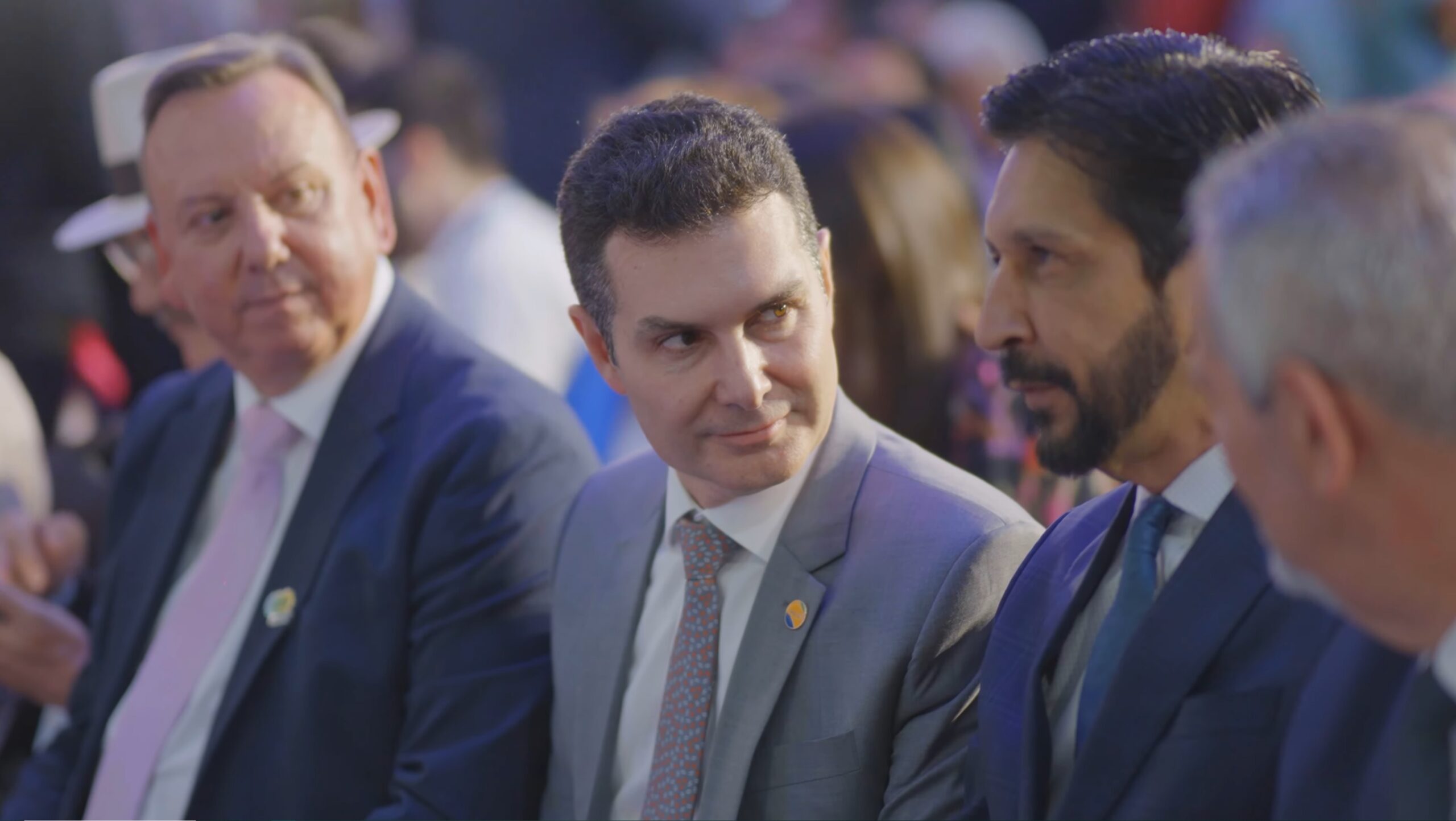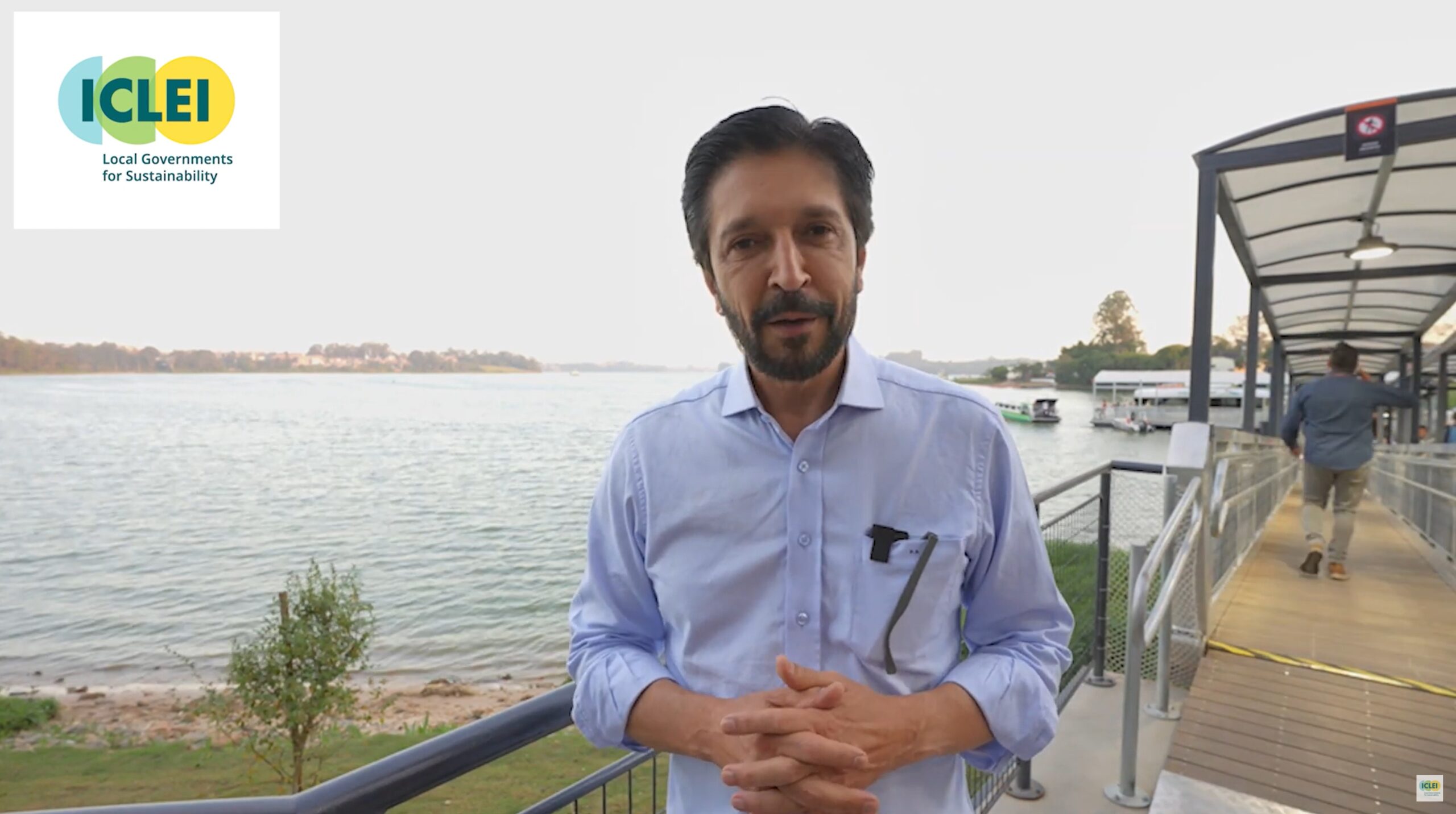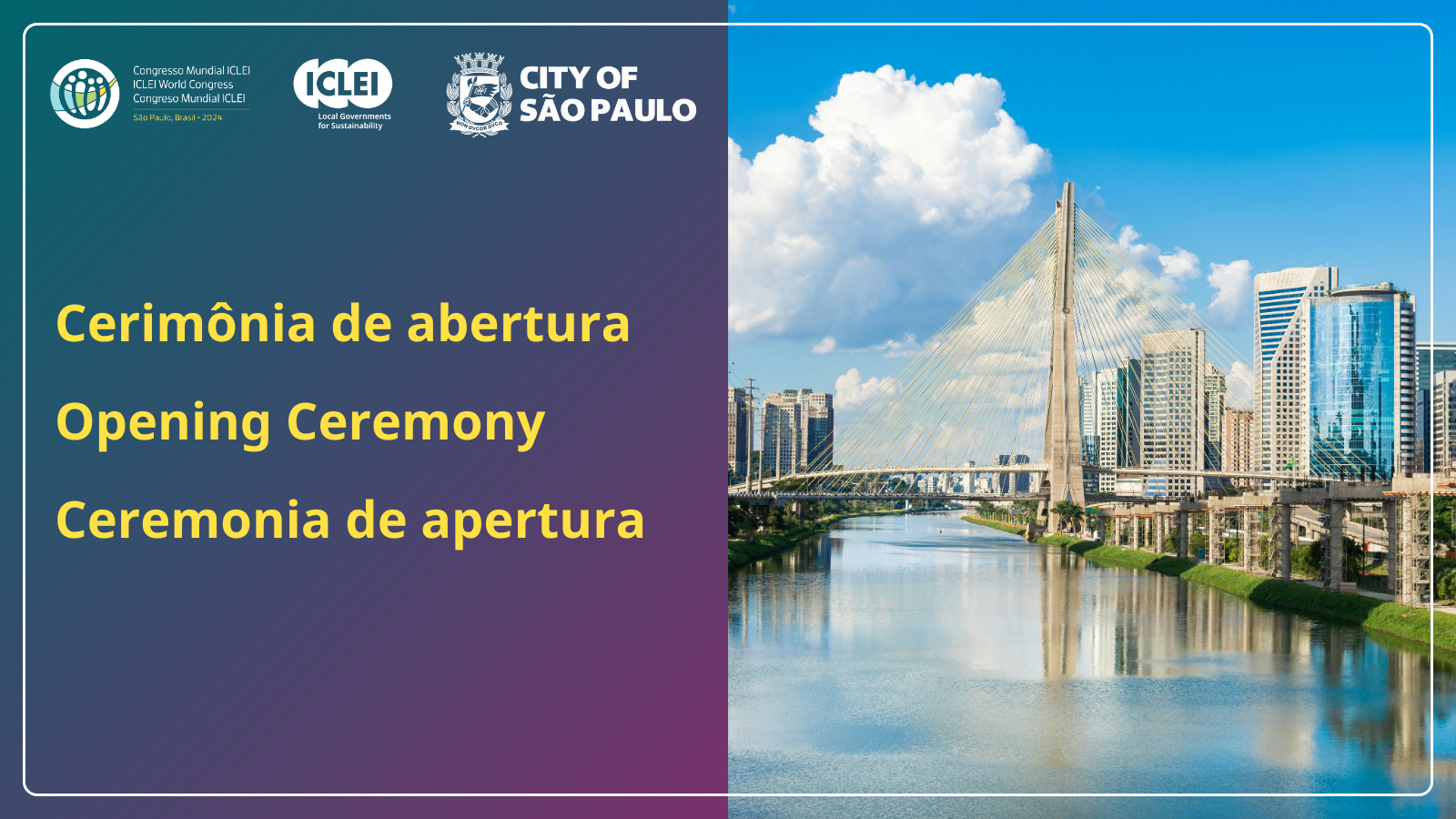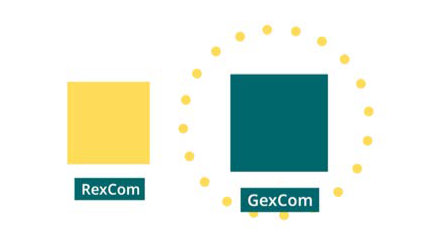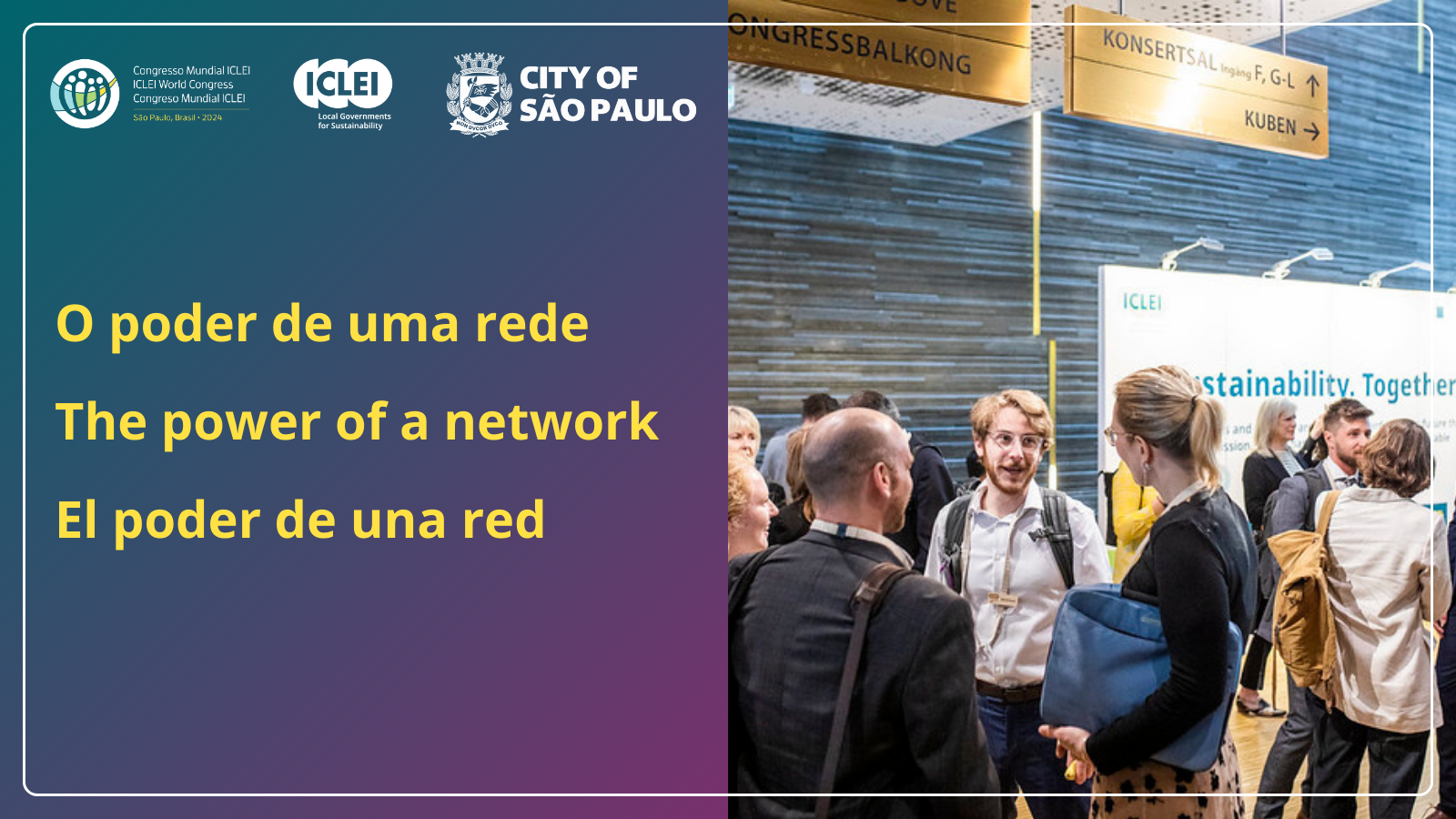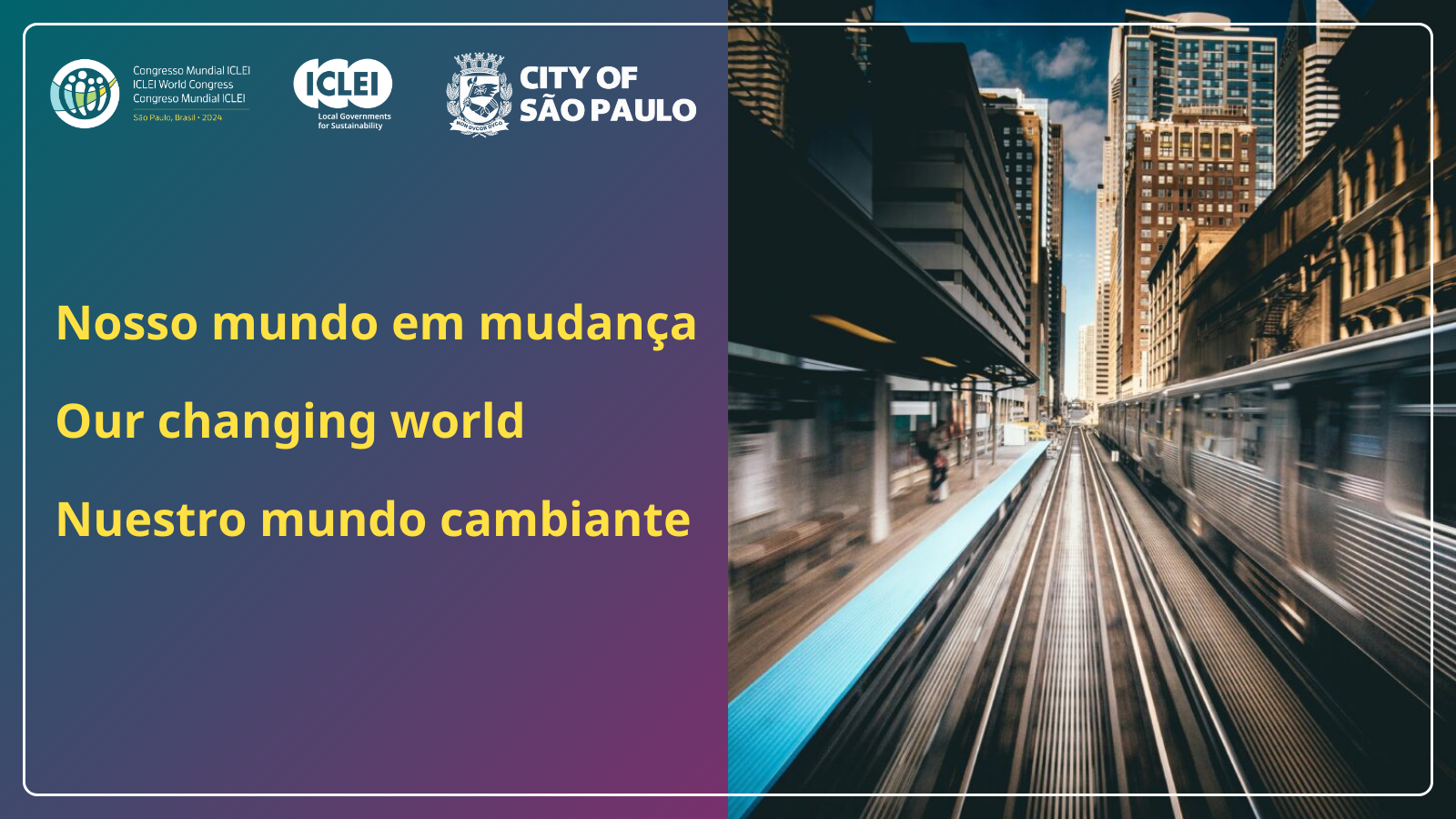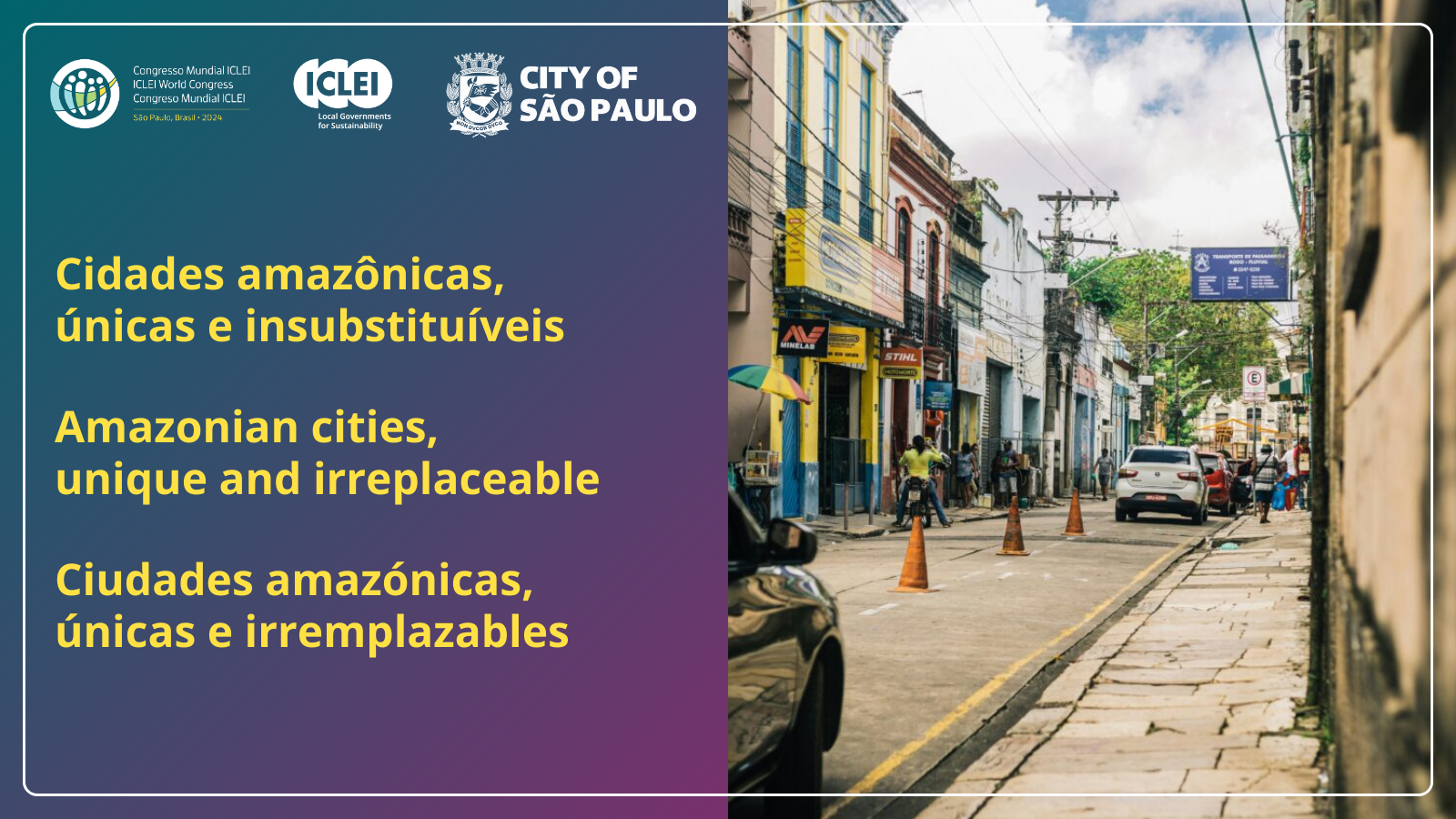Introduction
Every three years, ICLEI hosts the ICLEI World Congress to showcase how local and regional governments across our network are advancing sustainable urban development worldwide.
The ICLEI World Congress connects local and regional government leaders and representatives with their peers and strategic partners, and provides a platform for discussions that will inform and enhance their work going forward.
The ICLEI World Congress is a platform to highlight how local and regional governments can collectively push for action and policy change that better positions local and regional governments to reach their potential. The Congress demonstrates the impact and potential of taking action together and demanding more effective global and national policy.
Additionally, as a content-rich event, the ICLEI World Congress facilitates learning and idea sharing, ultimately conveying what sustainability looks like on the ground and what it really means for those who transform concepts and goals into policy and action. Technical staff and policymakers in city and regional governments get exposed to new and alternative ideas that they are able to bring back to their local contexts.
The ICLEI World Congress 2024, hosted by the City of São Paulo, Brazil, was a pivotal gathering focused on advancing sustainable urban development and equitable adaptation to local and regional challenges. Running from 18 – 21 June, this year’s Congress delivered a journey of reflection and forward-looking vision, emphasizing the critical challenges and opportunities facing cities, towns, and regions due to rising global risks and changes.
Over 1500 attendees, including more than 100 mayors, from 95 countries came together to exchange with and inspire one another on the best practices in sustainable urban development.
Central themes included leveraging ICLEI’s strategic pathways for sustainability, understanding the unique role of regions like the Amazon region in global biodiversity and sustainability, and exploring the impact of climate and sustainability at all levels of government. Through these thematic lenses, the Congress aimed to inspire, equip, and mobilize local and regional governments towards a sustainable and resilient future.
The theme of the Congress in 2024 was Transforming commitments into action. We explored how leaders can enable action despite the ever-changing contexts in which they must operate, ensuring continued implementation of sustainable development policies that work toward transforming our systems and achieving our targets and commitments.
In 2025, the world will turn its eyes to Brazil for UNFCCC COP30 in Belém, a critical moment in the global climate agenda. The ICLEI World Congress 2024 helped to deepen the dialogue on the ongoing global processes in the areas of climate, nature, and broader sustainability and highlight the relevance of these processes on the local and regional levels, underscoring the critical element of multilevel governance to achieve these broader global goals. Additionally, the ICLEI network also had the chance to weigh in on the IPCC Special Report on Cities and Climate Change during the seventh triennial Global Research & Innovation Symposium at the Congress, and offered an unparalleled chance to gain insights from leading IPCC experts on the objectives and content of the Special Report.
Cities, towns and regions in the ICLEI Network are united on a shared journey towards a sustainable and equitable world. The ICLEI World Congress 2024 provided a unique opportunity for the ICLEI network of over 2500+ cities, regions, and towns, from 125+ countries across the world, to gather and share practical knowledge that can drive local action for zero emission, nature-based, equitable, resilient and circular urban development.
ICLEI World Congress 2024 in Numbers
attendees from 95 countries
mayors and governors
ICLEI staff and 20 local volunteers
A special thanks to our local volunteers: 20 local volunteers were selected to support the ICLEI World Congress 2024 main activities. These included: preparing reports for the plenary and thematic sessions; translating Portuguese, English and Spanish; organizing the event’s logistics; providing support for side event accreditation; and other activities to support session leaders and congress participants. Our volunteers were key in the success of the Congress.
The power of a network
With more than 2500 cities, towns and regions from around the world engaged in our work, ICLEI is the largest network of local and regional governments advancing sustainable development worldwide.
ICLEI is driven by our Members. They shape our organization, and with their leadership, we stand as a united global force of local and regional governments committed to sustainability. Every three years, we invite representatives from ICLEI’s Member cities, towns and regions to stand for governance elections to help guide the direction of our network.
At the ICLEI World Congress 2024, we introduced our newly elected leaders – the ICLEI Council, who will serve for the next three years – and the new ICLEI Presidium, who have taken up the mantle to lead our network in achieving our goals at home and globally.
While ICLEI uses the full power of our network to ensure that local sustainability delivers on the goals and aspirations of the global sustainable development agenda, we continue to extend and measure our impact on the ground through programs, projects and initiatives.
Our flourishing network represents small, large, and fast-growing cities, vast metropolitan areas, provinces and regions. ICLEI, as a network, IS the diversity of the urban world and the challenges and opportunities that come with it.
Through our São Paulo Strategic Vision 2024 – 2030, released during the Congress on 19 June 2024, local and regional governments of the ICLEI network set a way towards the transformation to sustainable development. This vision, set forth in the voice of our local and regional governments, creates a picture of what is needed for a truly sustainable urban world.
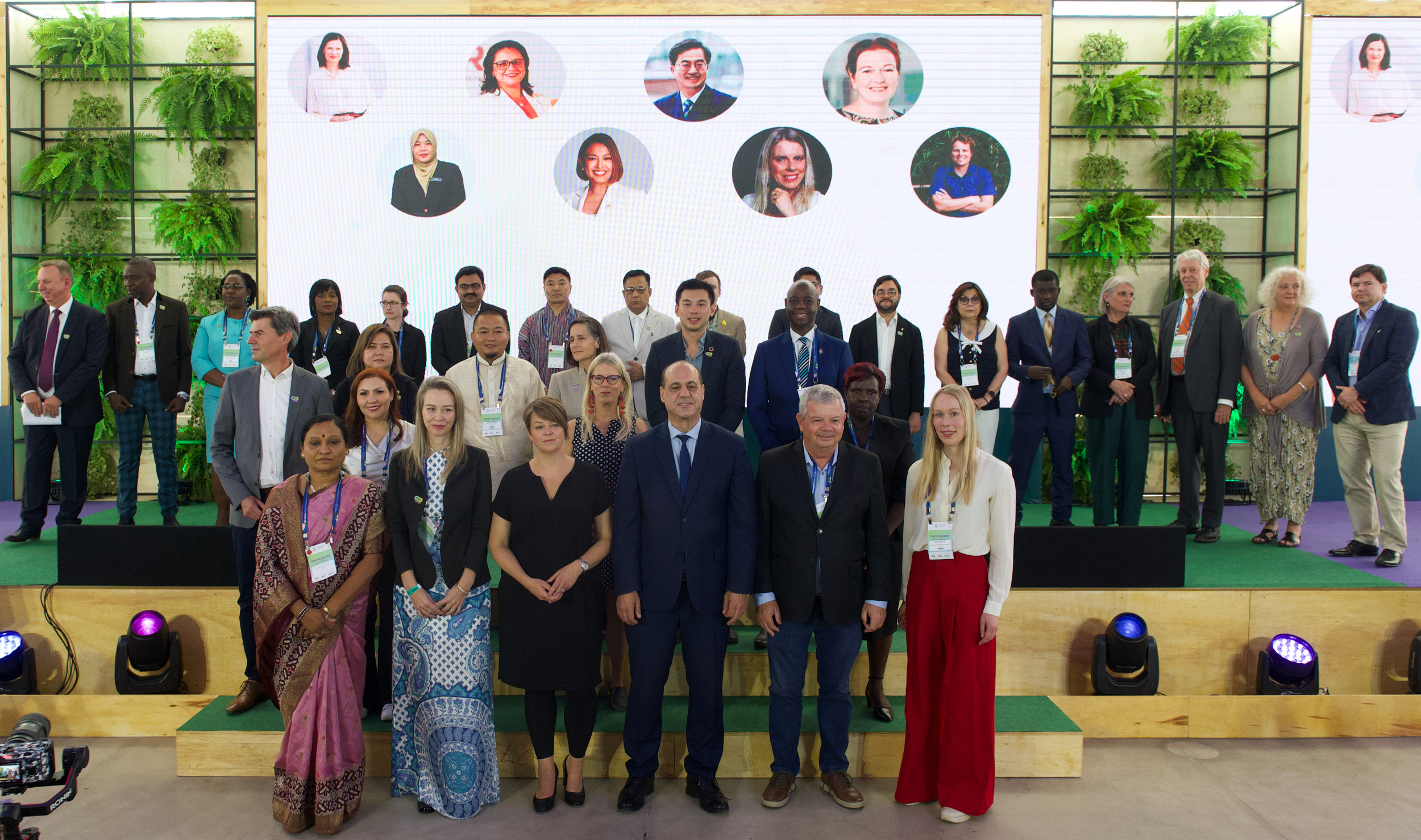
SPOTLIGHT
Mayor of Malmö elected president of ICLEI
Mayor of Malmö has been chosen to lead ICLEI – the largest network of cities and regions committed to sustainability.
The ICLEI São Paulo Strategic Vision 2024 - 2030 released
The Power of Our Network in a Changing World – ICLEI’s strategic vision for the next three years – sets a way towards the transformation to sustainable development. ICLEI is and has always been committed to creating global change through work that starts on the local level. Together, we must demonstrate visionary leadership, lead by example, share our knowledge actively and openly and speak with a united voice. Our ICLEI São Paulo Strategic Vision 2024 – 2030 is a critical part of that promise.
The 2024 report on our activities, Our network of impact, released
Every year, ICLEI undertakes hundreds of activities, alongside our local and regional government Members, to deliver sustainable development through our five pathways of zero emission, nature-based, equitable, resilient and circular development. Explore our activities and impact in this report, produced for the ICLEI World Congress 2024.
ICLEI Gender Declaration announced
ICLEI’s new Gender Declaration marks a significant commitment to embedding gender equity into the organization’s core mission. This declaration will serve as a guiding framework for ICLEI’s network, focusing on empowering women, addressing gender- specific challenges, and fostering inclusive governance and planning. The announcement highlighted the critical need for gender-responsive urban planning to ensure equitable benefits for all genders, emphasizing the importance of inclusive and equitable urban development practices.
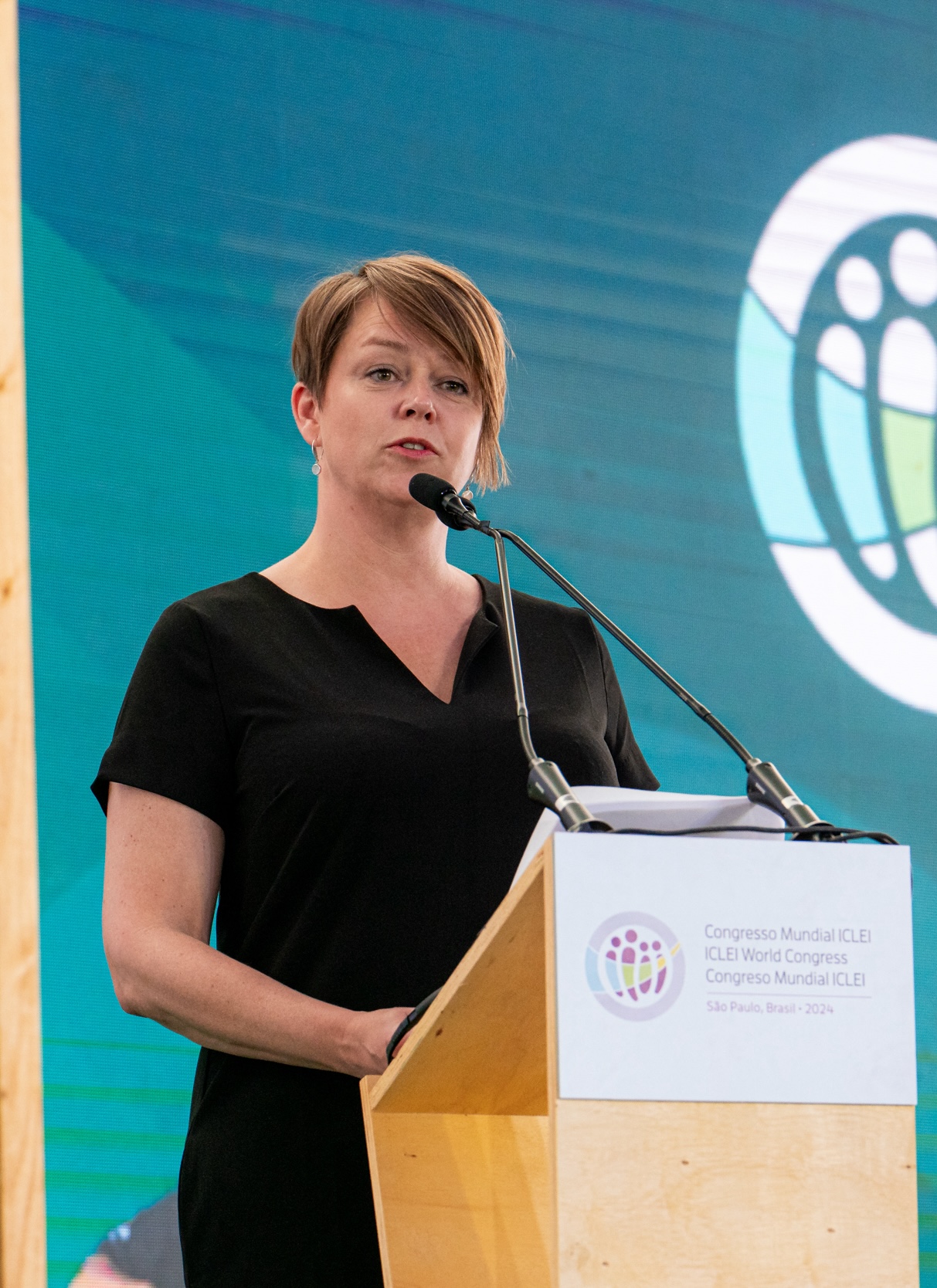
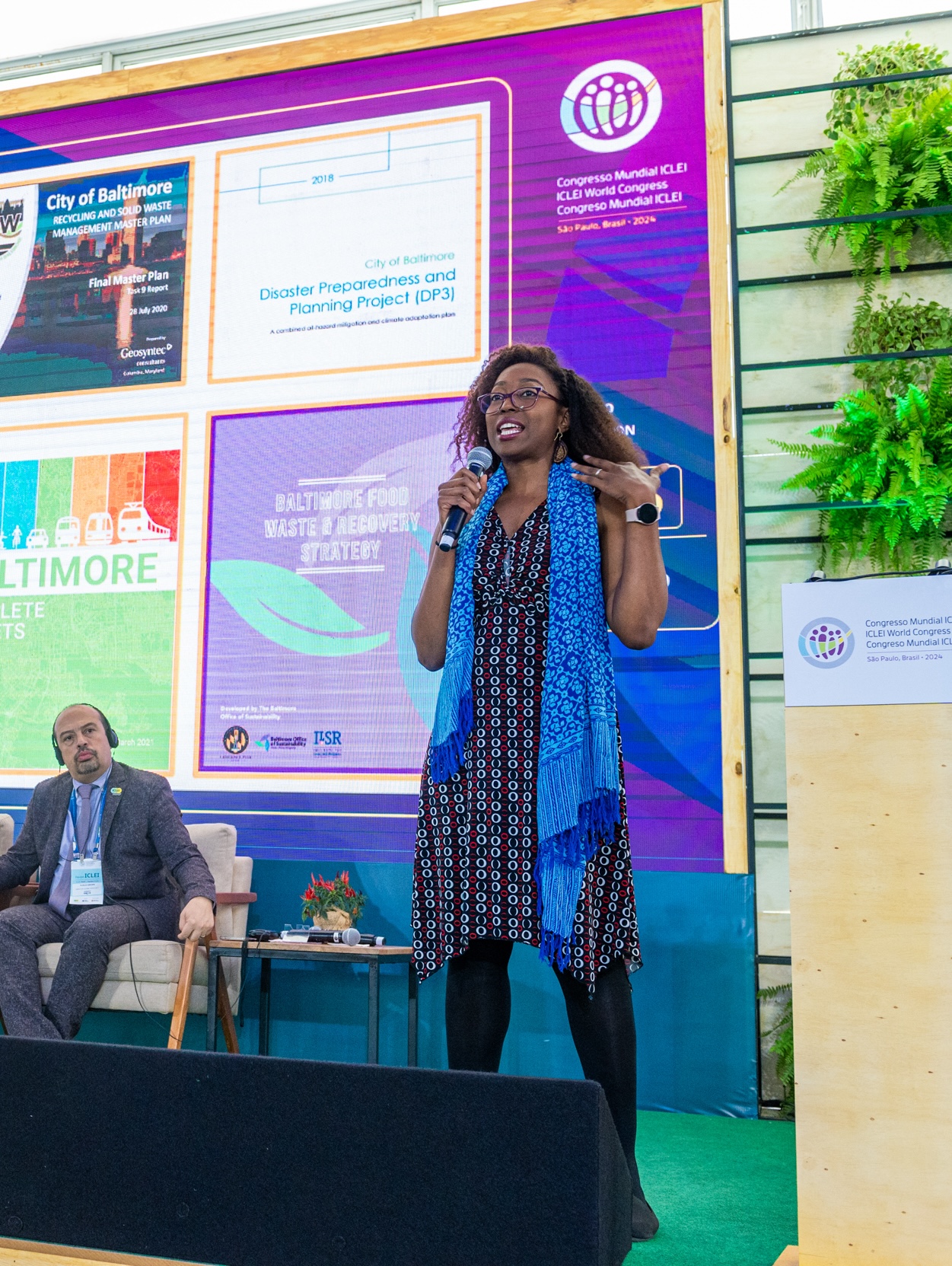
ICLEI and Climate Bonds Initiative partner to boost sustainable development projects
On 18 June, ICLEI and the Climate Bonds Initiative announced a strategic partnership to empower local governments by linking high-impact subnational climate projects with essential financial resources and expertise. The partnership focuses on project mobilization, capacity building, technical assistance, and joint fundraising to promote sustainable investment and climate-resilient development. It is conducted under the Transformative Actions Program (TAP), a global initiative that brings together financial institutions, project preparation facilities, and the private sector to assist subnational governments and local businesses in turning their sustainable infrastructure ideas into solid and investment-ready projects.
ICLEI-Kaohsiung Smart and Net Zero Cities Community announced
The City of Kaohsiung announced a new partnership with ICLEI to host a community of practice for cities that are committed to net zero by 2050 goal. The community of practice invites Asia-Pacific cities to participate and contribute to capacity building and peer exchange on climate neutrality topics. The community also will have visibility at global advocacy events to raise the profile and ambition of cities in the region.
Our changing world
We are living in times of rapidly accelerating technological change and economic uncertainty, as the world is plagued by two dangerous crises: climate and conflict.
These crises exacerbate the challenges that our cities, towns and regions already face worldwide, and further complicate the work that local and regional governments have already accomplished in advancing sustainability efforts in their communities. Our cities, towns, regions and communities must already plan for and adapt to a future beyond 1.5°C.
At the Congress, ICLEI leaders from around the world shared how they have been able to advance local sustainable development in spite of – or in response to – our changing world, and how they are preparing their communities for a new climate normal. The experiences of ICLEI Members from Brazil were especially highlighted, focusing on their efforts to adapt their communities to this new climate normal in a just and equitable way.
Urban Infrastructure Insurance Facility Project (UIIF) announced first seven city signatories
The Urban Infrastructure Insurance Facility (UIIF) was launched to enhance urban resilience against natural hazards with innovative insurance solutions. Seven cities from Mexico, Brazil, Jamaica, and Honduras—Curitiba, Porto Alegre, Recife, Reynosa, Mérida, Tegucigalpa, and Kingston—are the first to join. Funded by KfW Development Bank on behalf of the German Federal Ministry for Economic Cooperation and Development (BMZ), UIIF helps cities measure risks and provides tailored insurance solutions. This initiative is vital for mitigating natural disaster disruptions and fostering sustainable urban development in Latin America and the Caribbean, setting a global example for urban leaders.
CityTalk
Cases from our network: Adapting to our changing world
Across the globe, cities and regions within the ICLEI network are spearheading diverse initiatives to tackle the climate emergency. Urban areas are becoming hubs of innovation and environmental stewardship, implementing projects that range from enhancing resilience against natural disasters to promoting renewable energy, and integrating green infrastructure. Cities are also addressing food security and waste reduction, often engaging local communities in the process. This global wave of urban transformation underscores a shared commitment to building sustainable, resilient, and inclusive cities for the future.
Related session recordings
100% Renewables Roadmap Project launched three roadmaps
ICLEI, in collaboration with the governments of Avellaneda (Argentina), Kisumu County (Kenya), and West Nusa Tenggara Province (Indonesia), unveiled tailored roadmaps to achieve 100% renewable energy by 2050. These customized plans, adapted to each region’s specific needs and resources, highlight the proactive leadership of cities and regions in the global energy transition. The project is funded by the German Federal Ministry for Economic Affairs and Climate Action (BMWK) through the International Climate Initiative (IKI).
ICLEI and IFRC kick off a coastal cities initiative
Building on a global partnership announced at COP28, ICLEI and IFRC kicked off the development of a coastal cities initiative for the Asia-Pacific, Africa and Latin America regions to reduce risks for coastal cities and nurture resilience. Coastal city leaders and practitioners were invited to develop and pitch potential project ideas to build a foundation for future collaboration opportunities.
SPOTLIGHT

Equity in Action: Shaping Local Climate Solutions for All
Aligning equity and climate mitigation priorities is crucial for developing sustainable cities that serve all residents, especially marginalized communities. Cities are increasingly integrating social equity into their climate strategies. Initiatives like the INCLU:DE project in Germany and the Malmö Commitment on Inclusive and Equitable Communities highlight successful efforts to align climate and equity goals in the cities of Malmö, Cleveland, Ludwigsburg, Rosario, and Teresina.
Spotlight on South America
Our Congress was hosted by the City of São Paulo, a long-standing ICLEI Member since 1991.
The largest city in Brazil and South America and the fourth largest metropolis in the world – home to over 12 million residents – it also serves as Brazil’s main economic and financial center. More than 20 million residents live in the Greater São Paulo metropolitan area.
The City of São Paulo plays a leading role in sustainability commitment, action and innovation. As a key player in the international forums, the city has participated in UN conventions since UNFCCC COP21 in Paris, as well as the Convention on Biodiversity COP15 in Montreal. At climate COP28 in Dubai, with the biggest delegation actively participating, the City announced they would host the ICLEI World Congress 2024, as well as a robust pack of initiatives to promote sustainable urban development for 2024 totaling more than R$15 billion (2.4 billion EUR) in investments.
The City has committed to creating solidarity and city-to-city cooperation opportunities as an essential part of addressing the global environmental, humanitarian, economic and health crises of our time. Since 2023, the City of São Paulo has been host to more than 40 international events that are already considered legacies for the city, such as the Virada ODS, the International Diplomacy Week, the Expo Internacional Dia da Consciência Negra, and the São Paulo International Summit; and has demonstrated a strong political commitment with city networks as Presidency of Mercociudades network and of the National Forum of International Relations (FONARI), the Vice Presidency of Metropolis and Co-chair of Urban 20 process.
Zooming out on the region, we see the iconic Amazon biome, encompassing the world’s largest rainforest and one of only three global hotspots for biocultural diversity. Its vast expanse crosses nine countries (Brazil, Peru, Colombia, Venezuela, Ecuador, Bolivia, Guyana, Suriname and French Guiana) and countless cities with an estimated 50 million residents – identified as ”Amazônidas” – who speak 86 languages and more than 650 dialects. According to the Brazilian Geography and Statistics Institute, IBGE, 72% of the population of the Brazilian Amazon resides in urban centers, and according to IDB, only 22.3% of the urban population in the Andean Amazon cities has limited access to electricity, contributing to the complexity of delivering sustainable public services.
Since 2021, ICLEI has promoted a robust Urban Amazon agenda: promoting the Forum of Pan Amazon Cities, a pioneering initiative that has brought together mayors and strategic partners to find solutions for urban social and environmental risks, running capacity building and training activities with an approach in adaptation and biodiversity, supporting inventories, risk and ecosystem services assessments and mentores for project preparation, as well as delivering Local Climate Action Plans.
Latin America, as the world’s most urbanized region, plays a pivotal role in global climate action especially because of its rich natural resources and unique environmental challenges.
With all three UN conventions meeting in 2024, including the Biodiversity COP16 in Colombia in October, the region’s significance in the global environmental agenda is more pronounced than ever.
Operating in South America since 2000, ICLEI connects 139 Members of local and regional governments in eight countries in the region. Since 2021, ICLEI South America has three offices—located in Medellin, Colombia; Rosario, Argentina; and São Paulo, Brazil—and employs more than 50 staff. It implements 40 cooperation projects and a service portfolio and organizes several events each year to promote sustainable and equitable cities and regions throughout the region.
SPOTLIGHT
Three ways São Paulo charts a greener today – and tomorrow
In 2009, the City of São Paulo made history by passing the Municipal Policy for Climate Change, making it the first city in Brazil to pass such legislation. Since then, this 12 million-people megacity has emerged as a shining example of dedication and progress towards sustainability.
Cases from our network: Spotlight on South America
From sprawling metropolises to small urban centers, South American cities in the ICLEI network are advancing sustainable urban development through comprehensive and equitable environmental strategies. By involving citizens in climate action planning, they promote resilience, zero emissions, and circular development. Initiatives range from urban reforestation and biodiversity protection to water conservation, ensuring all communities benefit from these advancements.
Related session recordings
Congress Outcomes: South America
The Congress marked a milestone in the international urban sustainability events agenda. Important announcements for the region, including the Brazil’s Ministry of Environment National Tree Planting Plan kick off, which will receive technical support from ICLEI. Additionally, South American mayors and the youth constituency delivered a series of declarations impacting local public policies.
ICLEI and Brazil's Ministry of Environment announced partnership
A cooperation between ICLEI and the Ministry of the Environment and Climate Change of Brazil (MMA) to develop the National Urban Afforestation Plan, was announced during the ICLEI Global Council meeting at the Tomie Ohtake Institute on 18 June, by Adalberto Maluf, National Secretary for Urban Environment and Environmental Quality.
Declaration of South American
Seventy-four cities from seven South American countries expressed the need for financing and resources to create urban resilience strategies and improve the ability to plan and implement solutions adapted to local and regional contexts. The Cities Declaration: Regional Commitment in Action represents a joint commitment by South American cities towards a more sustainable future and recognizes the imminent need to act with urgency and determination in the face of the current threat posed by the climate emergency.
Youth Manifesto for just transition
The Youth Manifesto, launched at the Congress, aims to promote a fair transition, prioritize human rights protection, and advocate for the political independence of young people. It includes recommendations for local governments and society as a whole and was developed through discussions and meetings of the Youth Advisory Board for the ICLEI World Congress 2024.
At the Congress’ closing plenary, Júlia Bonitese, youth activist and ambassador for climate justice, highlighted the importance of active young people’s participation in local and global climate action.
Additional announcements:
- New FAO – ICLEI Guide for public managers on sustainable food systems launched, with a new term for the LUPPA project, Latin America’s largest urban food systems laboratory.
- New ICLEI partnerships on resilience announced between the governments of the State of Piauí and the Cities of São Sepé and Itabirito for Climate Compliance plans.
- New ICLEI – Fortaleza technical collaboration for the Re-Ciclo program on selective waste collection by waste pickers using electric vehicles (tricycles). A technical collaboration protocol was also signed with CITinova to replicate the project in other cities.
- New ICLEI – Tip Magazine issue Paradiplomacy and Environmental Agendas on innovative strategies in climate change, energy transition and sustainable development released during the side event on Global Cities organized by Barcelona Centre for International Affairs (CIDOB).
- New ICLEI project kick-off between the Union of Ibero-American Capital Cities (UCCI) that consists of a regional comparative study of heat waves and cities’ adaptation initiatives and a joint manifesto of Ibero-American cities to be presented at COP29.
SPOTLIGHT

Unique and Irreplaceable Cities Making the Urban Amazon Visible
Amazonian cities are diverse in opportunities and needs. The region’s biodiversity is among the world’s most important, but its cities’ sustainability challenges are less well-known. These jurisdictions require financial support and capacity building to create sustainable, conservation-oriented, equitable, urban green spaces with circular development. At the ICLEI World Congress 2024, mayors from this region convened to amplify the voices of these unique cities.
Sustainability up close and personal: Site visits in São Paulo
On 20 June, more than 200 participants fanned out across São Paulo for technical site visits with city leaders, program staff and technical experts. The mobile workshops represented an opportunity to connect Congress discussions with policies undertaken by both the São Paulo City Hall and the Government of the State of São Paulo. In total, eight site visits featured relevant cases involving cross-cutting approaches on waste management, circular economy, and environmental education; green infrastructure with wildlife and public health; or electric and waterways mobility solutions, where Ricardo Nunes, Mayor of the City of São Paulo, presented to ICLEI’s Global Council on the city’s first public water transportation.
From global to local to global
Building on the unprecedented COP28’s multilevel action momentum and with the upcoming Biodiversity COP16 and Climate Change COP29 by year-end, cities and regions have a window of opportunity to amplify their voices in the global climate discussions.
The powerful interplay between these two critical global agendas and their impacts on policy-making will also shape the roadmap toward Climate Change COP30 in Belém, Brazil, in 2025. These global processes influence local and regional initiatives, stressing the need for global strategies to address on-the-ground challenges faced by cities, towns, and regions worldwide.
At the Congress, mayors and climate leaders, including Razan Al Mubarak, COP28 High-Level Champion and President of the International Union for Conservation of Nature; and Maimunah Mohd Sharif, Special Advisor to COP29 Presidency, emphasized that now is the time for local and regional governments to push for an integrated approach to the climate and nature crises, as well as cross-government action to achieve the urgently needed transformations toward a sustainable world.
In addition, as the primary component of the first day of the ICLEI World Congress 2024, the ICLEI Global Research & Innovation Symposium convened researchers, innovators, urban practitioners, and investors to foster a new generation of “next practices.” Significant topics shaped this seventh edition, including high-level plenaries on the IPCC Special Report on Climate Change and Cities (SRCC) and discussions on agenda-setting innovation and emerging technologies. The event also featured its signature Research & Innovation Marketplace, offering an interactive space for bridging the gap between concepts, action, research, and financial support.
Igniting Innovation, Accelerating Action: The seventh triennial ICLEI Global Research & Innovation Symposium
The Global Research & Innovation Symposium was the primary component of the first day of the ICLEI World Congress 2024. With registration closing early due to overwhelming demand, it brought together more than 150 in-person participants and 20 invited high-level speakers, setting the stage for a high-energy and impactful week in São Paulo.
This full-day program was designed and delivered under ICLEI’s Global Research & Innovation Strategy in partnership with Mission Innovation Net-Zero Compatible Innovations Initiative, UNFCCC Global Innovation Hub, Open Earth Foundation, and Global Covenant of Mayors for Climate and Energy (GCoM), and served as a complementary event to the upcoming Innovate4Cities 2024 Conference (I4C24) in Montreal, Canada. The event was hosted by the São Paulo School of Management of Fundação Getulio Vargas (FGV EAESP) and supported by the University of São Paulo (USP).
Key speakers included
- Heiko Buch-Illing, CEO of the Outdoor Institute in Silkeborg, Denmark;
- Amelia Clarke, Professor, University of Waterloo;
- David Ekelund, CEO of Icebug;
- Pedro Jacobi, President of the Board of Directors, ICLEI South America Secretariat, and Professor at the University of São Paulo;
- Benjamin Jance, Head of Research and Innovation, Global Covenant of Mayors for Climate and Energy (GCoM);
- Dennis Pamlin, Chief Executive Officer, The Net-Zero Compatibility Initiative, Mission Innovation;
- Jose Puppim de Oliveira, Professor, FGV EAESP;
- Smita Rakesh, Partner, Social Alpha;
- Rodrigo Ravena, Secretary of Green and Environment, São Paulo City Hall;
- Randy Sa’d, Executive Director, REFOCUS & Flourishing Enterprise Institute;
- Diana Ürge-Vorsatz, Vice-Chair of the IPCC and Chair of the Urban Research and Innovation Portfolio for the ICLEI Global Executive Committee; and
- Martin Wainstein, Executive Director, Open Earth Foundation.
In addition to high-level plenary discussions, the Research & Innovation Marketplace – delivered in partnership with I4C24 – was a highlight of the day. It gave selected pitch makers, including mayors and city representatives, urban practitioners, academics and international organizations, the opportunity to pitch and receive valuable feedback from the audience and invited experts on their concepts and projects in four thematic areas: Digitalization, Finance, Governance & Urban Planning, and Systems Transformation.
Key outcomes of the 2024 Global Research & Innovation Symposium
Several key outcomes emerged from the day that are crucial for our collective journey toward sustainability and climate action. They include enhancing ecosystems of collaboration, integrated and human needs-centered innovation, the urgent need for innovative finance, accessibility and quality of data in digitalization, policy relevance, and the synergy of global and local efforts.
Enhanced ecosystems of collaboration
The Symposium successfully brought together various stakeholders, including cities, academia, business, and international organizations. This collaborative environment emphasizes the importance of inclusive and co-created solutions, fostering a spirit of partnership essential for addressing complex global challenges and encourages lengthening the table to include actors such as sustainability and climate startups and incubators.
Integrated and human needs-centered innovation
The event highlighted the necessity of innovation centered on human needs. This approach transforms challenges into opportunities by aligning business models with environmental management. The Symposium showcased how sustainable solutions can be more effectively developed and implemented, an approach encapsulated by the Expanded Climate and Innovation Agenda and associated tools led by Mission Innovation with ICLEI and the UNFCCC Global Innovation Hub.
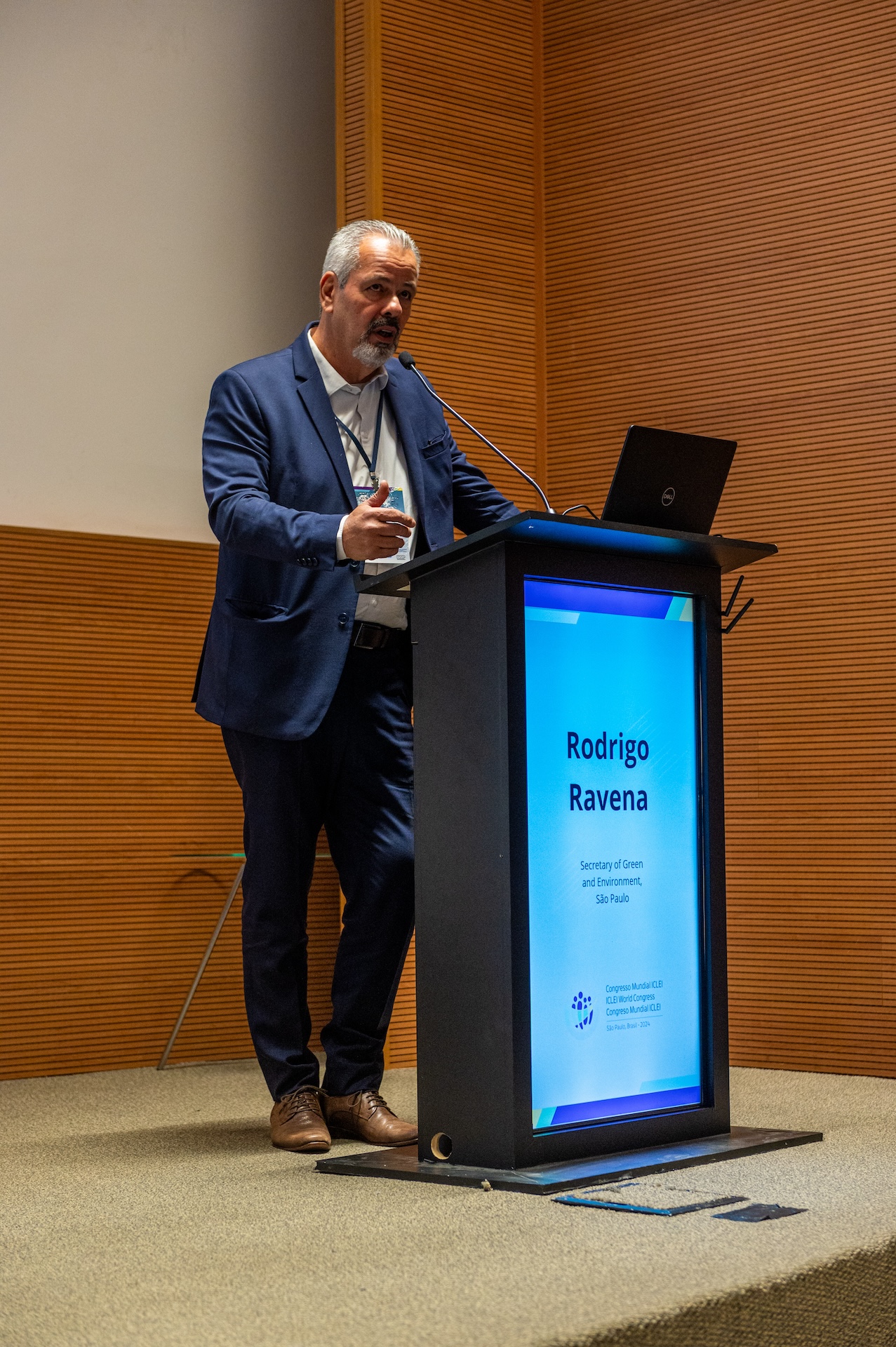
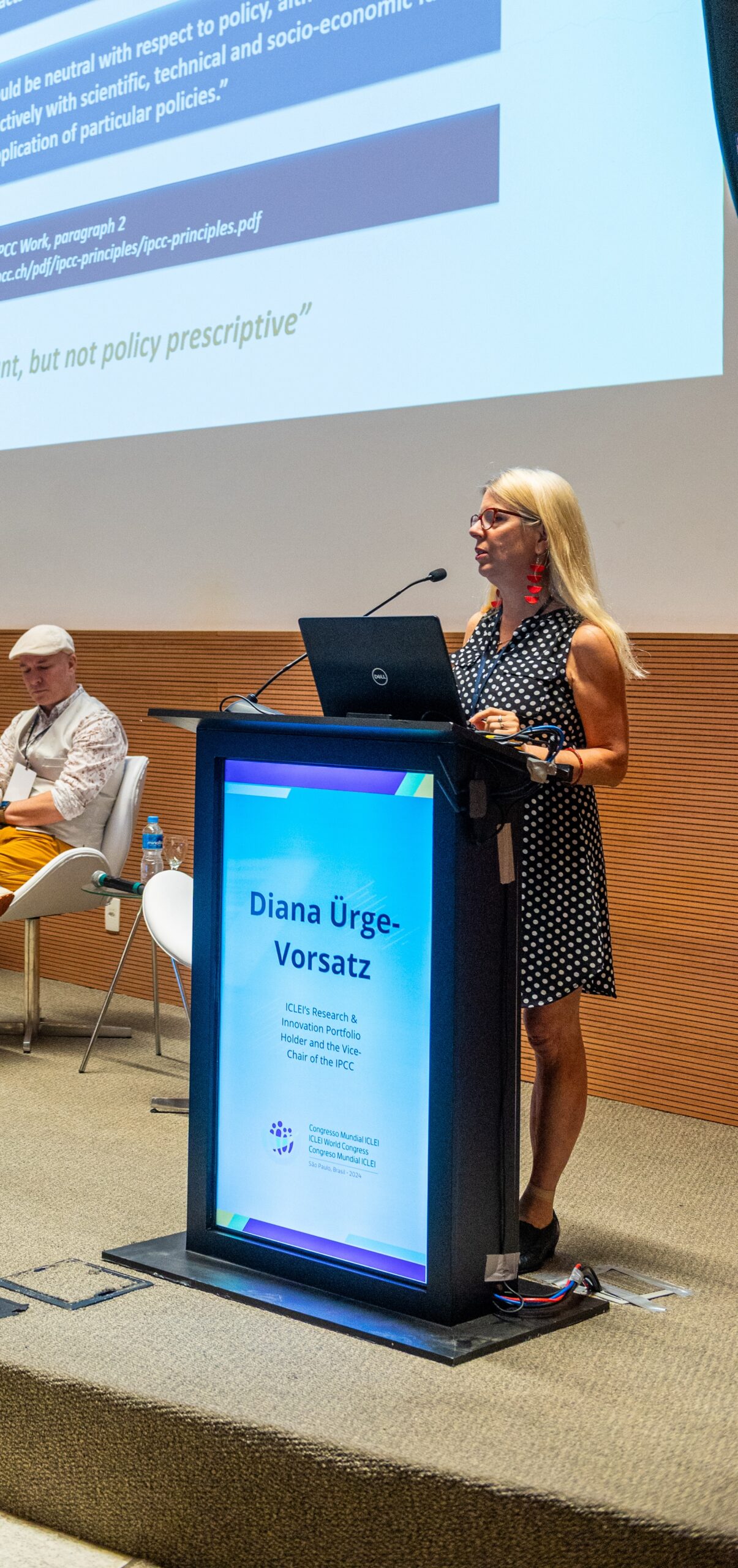
The urgent need for innovative finance
One of the critical discussions at the Symposium was the pressing need for innovative financial solutions to support sustainable initiatives. The Symposium underscored the gravity of this situation and the importance of developing new financial models and investment strategies that can provide the necessary resources to drive impactful change and support long-term sustainability projects.
Accessibility and quality central to digitalization and leveraging new technologies
As digitalization and new technologies become increasingly integral to sustainability efforts, the Symposium emphasized the importance of ensuring accessibility and maintaining high quality. This means making sure that technological advancements are available to all, regardless of socioeconomic status, and that they are implemented in ways that enhance, rather than hinder, sustainability goals.
Policy relevance for research products
The discussions underscored the importance of producing reports and recommendations that are policy-relevant but non-prescriptive. This means creating documents that provide valuable insights and guidance without dictating specific actions. The IPCC Special Report on Climate Change and Cities aims to be an example of this by incorporating the insights of both scientists and practitioners. By integrating scientific knowledge with local insights, these reports can help policymakers make informed decisions tailored to their unique contexts, ultimately leading to more effective and sustainable outcomes.
Global AND local efforts
The Symposium showcased both global leadership in innovation and energy transition and local efforts in sustainability. This dual focus highlighted the interconnectedness of these initiatives and the importance of collaboration across different levels. By recognizing and supporting global and local efforts, the Symposium emphasized the need for a comprehensive approach to sustainability that leverages the strengths of diverse stakeholders and addresses challenges from multiple angles. Especially highlighted was the ongoing and future work of Brazilian cities to lead on innovative solutions in the run-up to COP30 in Belém.
One key influence for the Symposium was the ongoing development of the IPCC Special Report on Climate Change and Cities. With Vice-Chair of the IPCC, Diana Ürge-Vorsatz leading the conversation in this regard, she highlighted the need for multifaceted, holistic innovation, including progressive policy and societal engagement and leveraging the knowledge and expertise of both scientists and practitioners to address complex climate challenges.
The insights and collaborations from the Global Research & Innovation Symposium were disseminated to the broader World Congress at two research and innovation panel discussions on the final day, and will inform discussions at I4C24 later in the year in Montreal, Canada, and subsequent knowledge products. This continuity ensures that the momentum and innovative spirit generated at the Symposium will drive further discussions and actions, fostering a global network of stakeholders committed to sustainable urban development and climate resilience.
Anchoring the São Paulo Urban Summit
The ICLEI World Congress 2024 was the main event of the São Paulo Urban Summit, a week full of activities that highlighted the fundamental role of cities.
During the week, in addition to the Congress, there was a preparatory meeting of Urban 20, a G20 Engagement Group that brings together cities from G20 countries to inform and influence national leaders’ discussions. As Brazil officially assumes the presidency of the G20, replacing India, Brazilian cities will lead the U20, elevating the voices of urban centers at the heart of the G20 economies. The aim of the U20 is to facilitate lasting engagement between the G20 and cities, raise the profile of urban issues on the G20 agenda, and establish a forum for cities to develop a collective message and perspective to formally contribute to the G20 negotiations.
The week also included the Metropolis Board of Directors Meeting, further reinforcing the importance of cities on the global stage, and the Mercociudades Board meeting that warned of the serious consequences of climate change in cities in Latin America and delivered the “São Paulo Declaration.”
Side events during the Congress
On June 17, 18, and 20, the Secretary of Environment and Infrastructure of the Government of the State of São Paulo hosted ICLEI World Congress side events and partner meetings. The 27 events showcased important actions and commitments such as the Nature Positive Call to Action of the High Level Champions Team, the Letter of Commitment for the CHAMP initiative of the National Mayors Front (FNP), and the Sustainable Development Index for Brazilian Cities (IDSC) from the Brazilian Program of Sustainable Cities, PSC. A session focused on unraveling climate finance and led by GCoM, GIZ, Gap Fund, and the ABDE, along with a matchmaking event driven by CDP and GCoM, brought together SBDs, investment facilities, and companies to discuss ways to enhance climate finance projects in cities.
The first Hemispheric Dialogue of the Cities Forward initiative, – a joint venture involving 24 cities in the Americas (12 in the U.S. and 12 in Latin America and the Caribbean), the U.S. Department of State, three regional and country offices of ICLEI, Resilient Cities Catalyst, and the Institute of the Americas-, facilitated by esteemed panelists, highlighted the need for cross-sector collaboration in tackling climate change and sustainability. The key takeaway was the necessity for ambition, realism, and optimism in enhancing community life.
Other ICLEI World Congress side events led by Regions4, the Mercociudades network, the Barcelona Centre for International Affairs (CIDOB), the American Red Cross and RCRC Climate Centre, the State of São Paulo, and the ICLEI regional offices stressed out a common vision to address climate and nature crisis.
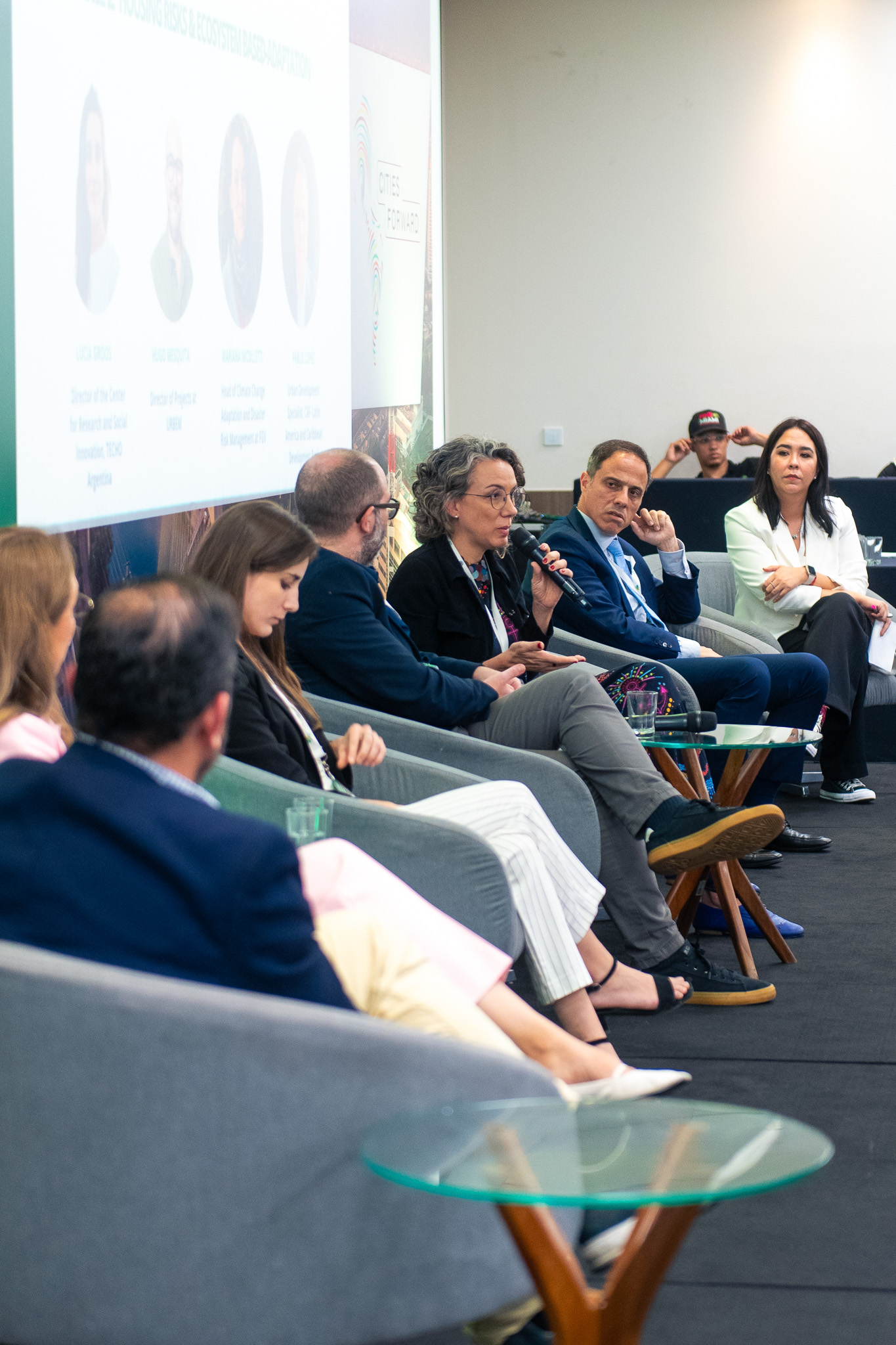
Cases from our network: Mechanisms for change
Cities globally are adopting diverse mechanisms to address climate change and promote sustainability, driven by collaborative efforts across sectors and levels of government. These transformative actions include citizen-led planning processes, youth engagement programs, and integrating indigenous knowledge. Many cities are taking integrated and holistic approaches to environmental policies and their financial, energy efficiency, and sustainable procurement strategies, making their local actions resonate on a global scale.
Call to national associations of local governments to support CHAMP and multilevel climate action
Mayor Katja Dörner, City of Bonn, Germany, and Chair of the Climate Action Governance Portfolio for the ICLEI Global Executive Committee made a call-to-action inviting all ICLEI leaders to proactively approach their national governments and national associations of local governments for multilevel NDCs by 2025. This call builds on outcomes from COP28 and the Coalition for High Ambition Multilevel Partnerships for Climate Action (CHAMP) initiative, which has been signed by 72 countries and is an effort intended to enhance cooperation with subnational governments in financing, implementation, and the monitoring of climate strategies.
Leaders were also invited to report their progress at the annual Daring Cities Forum. This followed an announcement on the first day of the Congress that Frente Nacional de Prefeitas e Prefeitos (FNP) – Brazil’s national association of cities – released a letter of commitment in which mayors pledged their support for CHAMP. This was followed by a similar resolution by the United States Conference of Mayors later in the week.
Cities and Regions Biodiversity Summit announced for the Biodiversity COP in Cali, Colombia
The 8th Summit for Subnational Governments and Cities, an official parallel event to Convention on Biological Diversity COP16, will take place on 26 October 2024 in the Blue Zone at the CBD COP in Cali, and is part of a 3-day program from 25-27 October. Announced by ICLEI and the City of Cali at the Congress, the Summit will continue a proud tradition, being the eighth such event since the first Summit convened 14 years ago.
At COP16, nations will be tasked with reviewing the state of implementation of the Kunming-Montreal Global Biodiversity Framework. Parties to the Convention are expected to show the alignment of their National Biodiversity Strategies and Action Plans (NBSAPs) with the Framework. COP 16 will further develop the monitoring framework and advance resource mobilization for the Global Biodiversity Framework.
New contributors to the Local and Subnational Governments Coalition to end plastic pollution
In April 2024, with the Government of Quebec, Government of Catalonia, UCLG, and further partners, ICLEI launched the Local and Subnational Governments Coalition to End Plastic Pollution. The purpose of the Coalition is to ensure that an ambitious but practical instrument is collectively shaped with local and subnational governments and ensures the participation and resourcing of local and subnational governments to contribute to ending plastic pollution. During the Congress, cities and subnational governments from five continents added their voice to the Coalition. The state of Rio de Janeiro and the city of Goyang, South Korea, were among those who joined the Coalition of Local and Subnational Governments to End Plastic Pollution, strengthening ICLEI’s efforts in circular economy and environmental impact reduction.
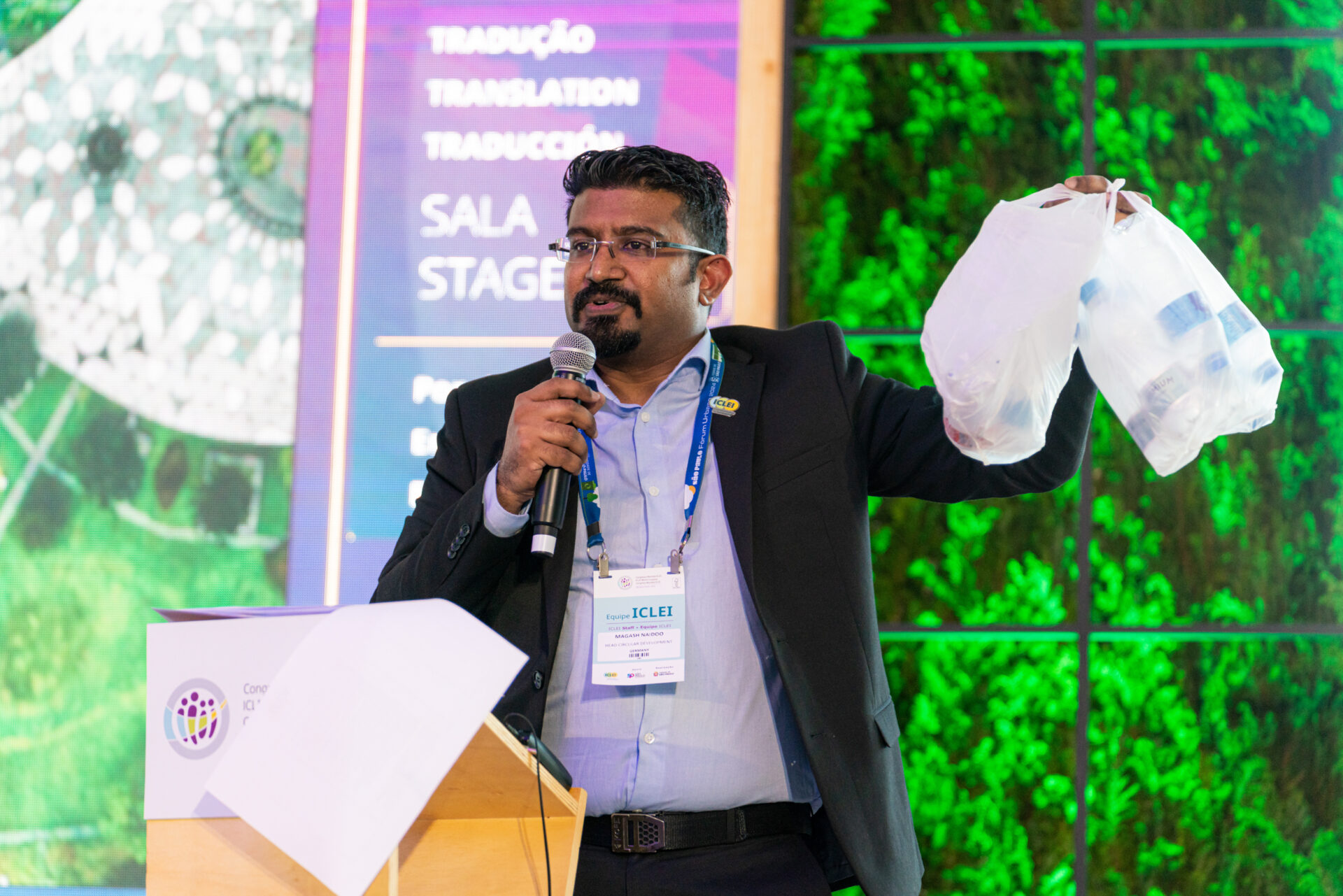
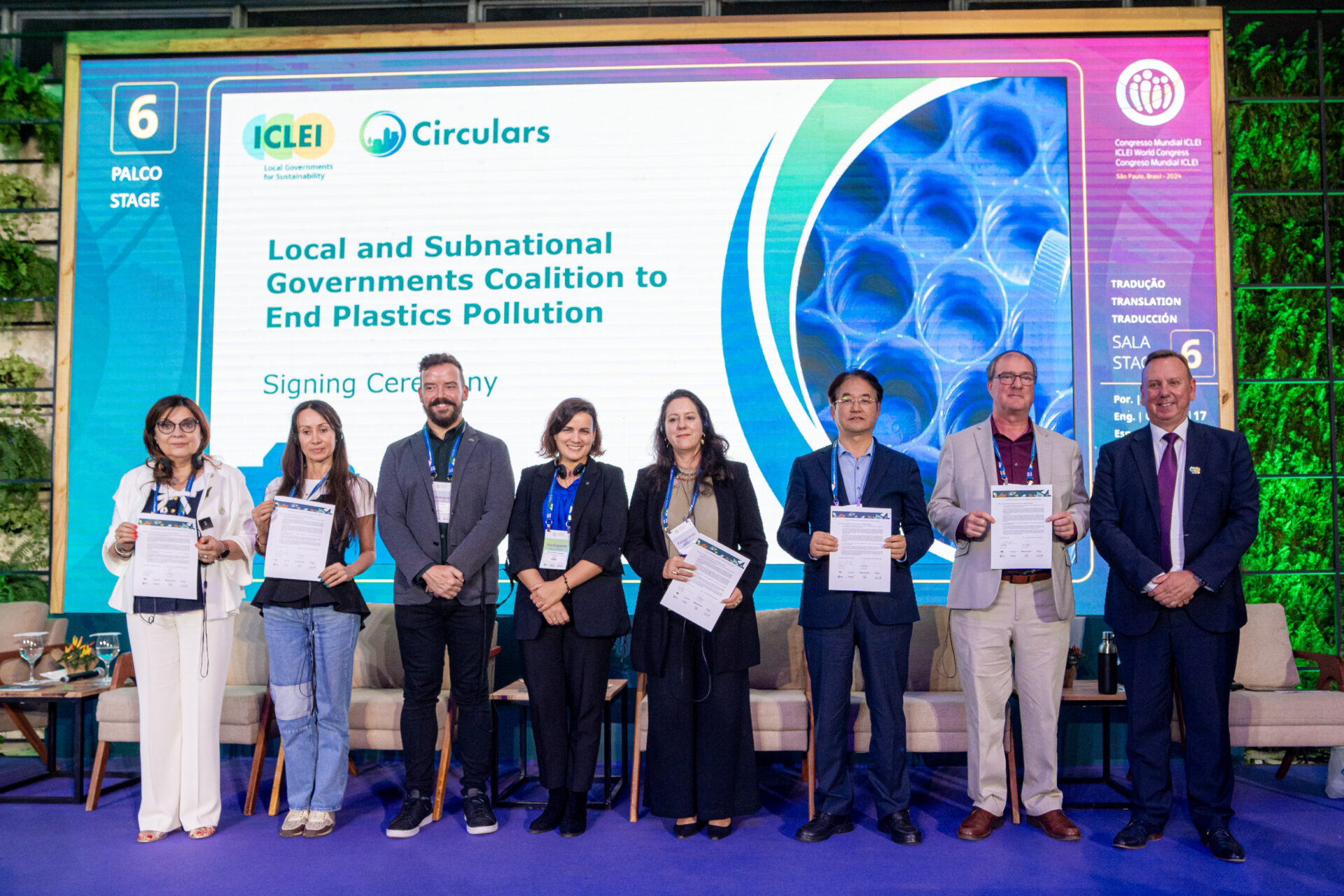

SPOTLIGHT
U.S. cities are raising climate ambition through subnational diplomacy
National associations of cities and city leaders, including in the United States, are taking country-level climate goals into their own hands, by advocating for stronger participation of subnational governments in climate decision-making.
A sustainable and equitable Congress
The ICLEI World Congress 2024 in São Paulo exemplifies a commitment to sustainability and equity in event planning and execution.
Hosted in the eco-friendly Ibirapuera Park, the event minimized its environmental impact through thoughtful venue selection, sustainable catering, and waste reduction strategies. Simultaneously, it prioritized inclusivity with accessible facilities, multilingual support, and diverse representation.
By integrating these principles, the ICLEI World Congress 2024 not only discussed sustainability and equity but embodied these values, setting a standard for responsible and inclusive global gatherings.
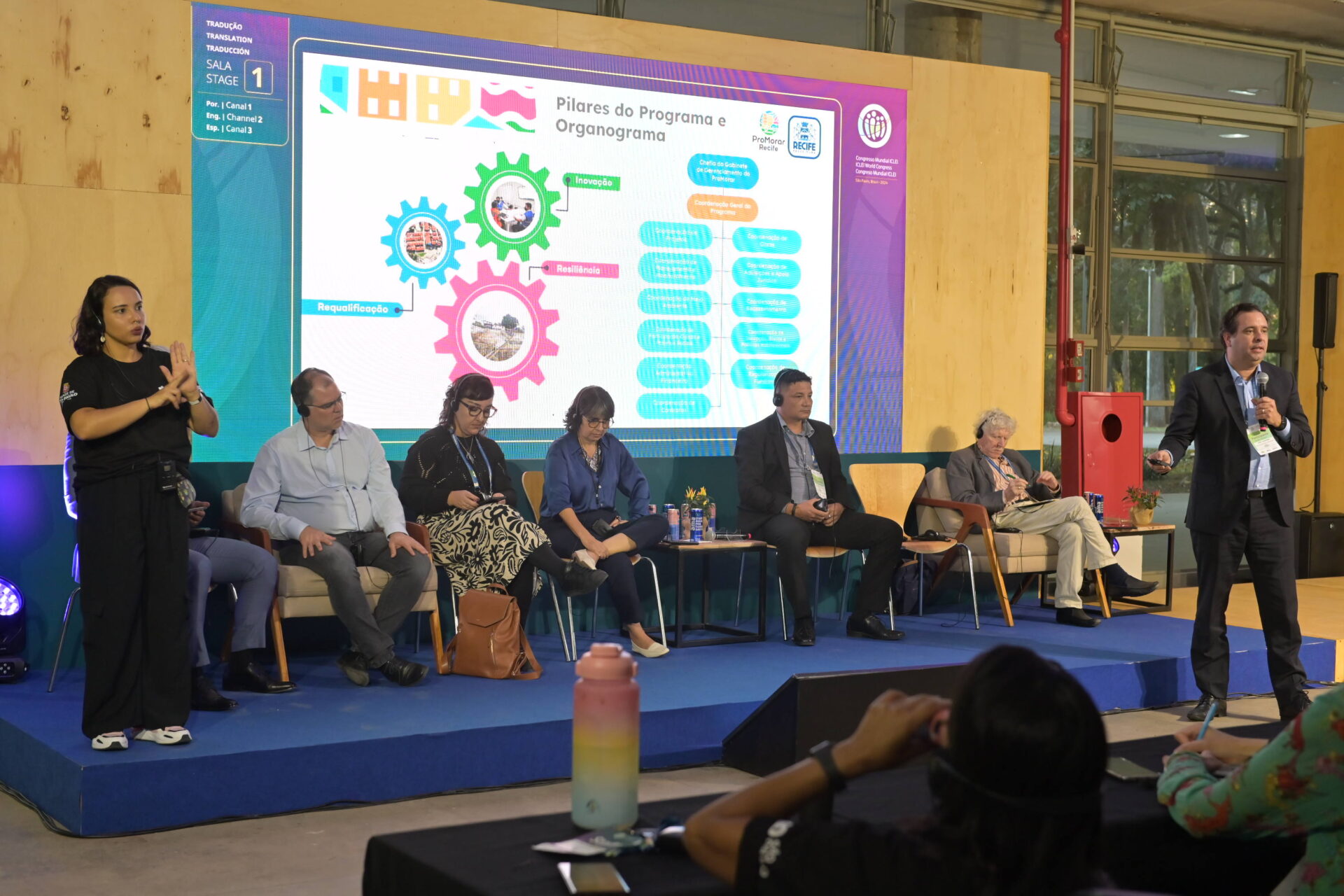
Sustainability at the ICLEI World Congress 2024
To align with our mission, ICLEI endeavored to deliver a sustainable event for all attendees at the ICLEI World Congress 2024.
A special feature of the Congress was hosting the core components inside the famous Ibirapuera Park in São Paulo. This unique venue allowed participants to experience the Atlantic Forest (Mata Atlântica), the second largest rainforest in the world after the Amazon Rainforest.
The venue, Pavilhão das Culturas Brasileiras, was designed by renowned Brazilian architect Oscar Niemeyer in the 1950s, featured a natural lighting system that significantly reduced the event’s ecological footprint.
Our commitment to sustainability
We committed to delivering a sustainable event for all our attendees with the support of the municipal investment and export promotion agency SP Negócios, the implementer of the event, by working to:
- Find sustainable catering with a variety of dietary options;
- Limit onsite waste including single use products;
- Offer environmentally responsible accommodation options;
- Provide water bottle filling stations on site;
- Encourage the use of public or shared transit through accessible locations;
- Limit the use of paper for event materials and communications;
- Procure materials and services locally where possible;
- Utilize natural lighting already abundant inside the venue.
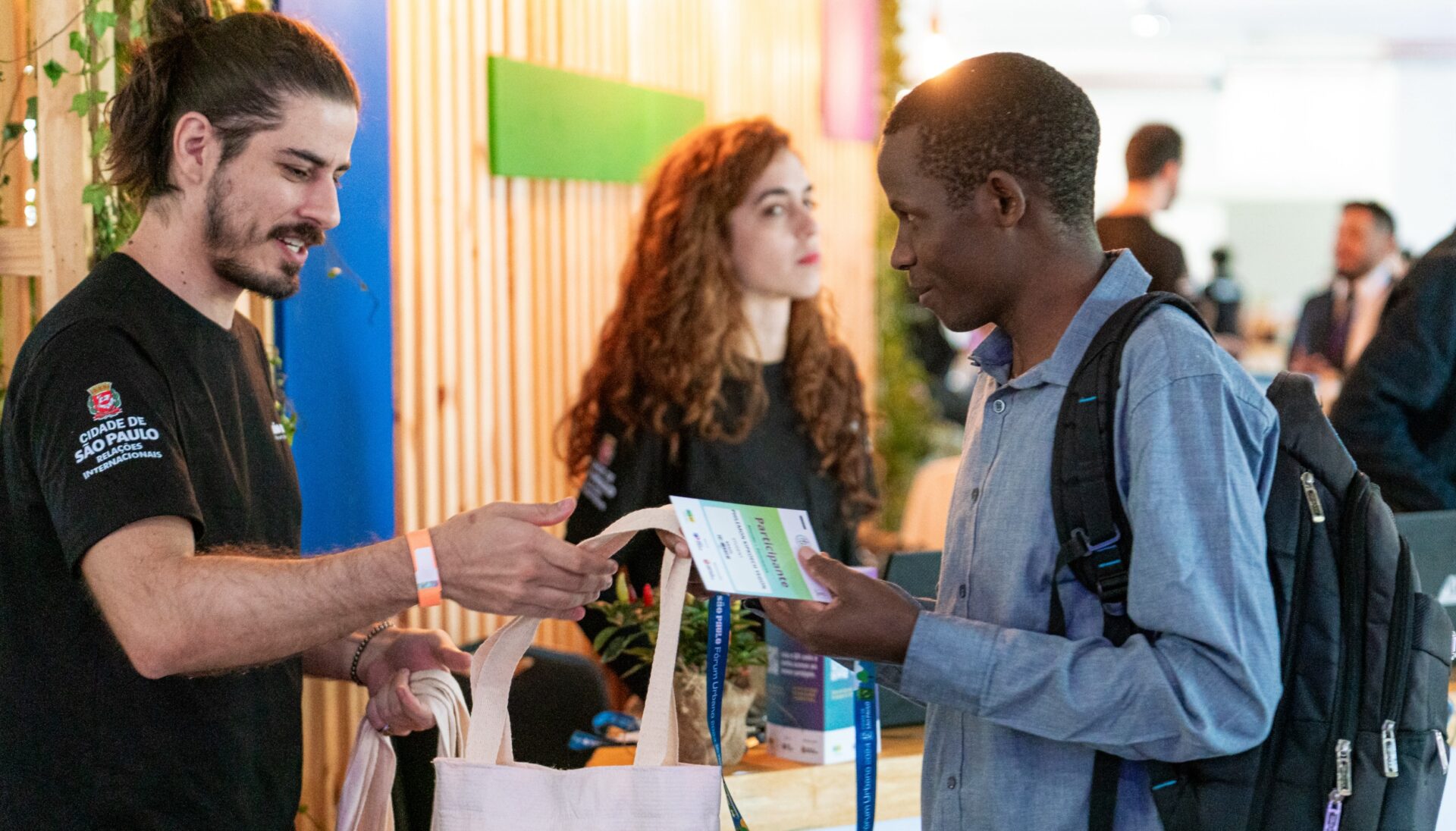
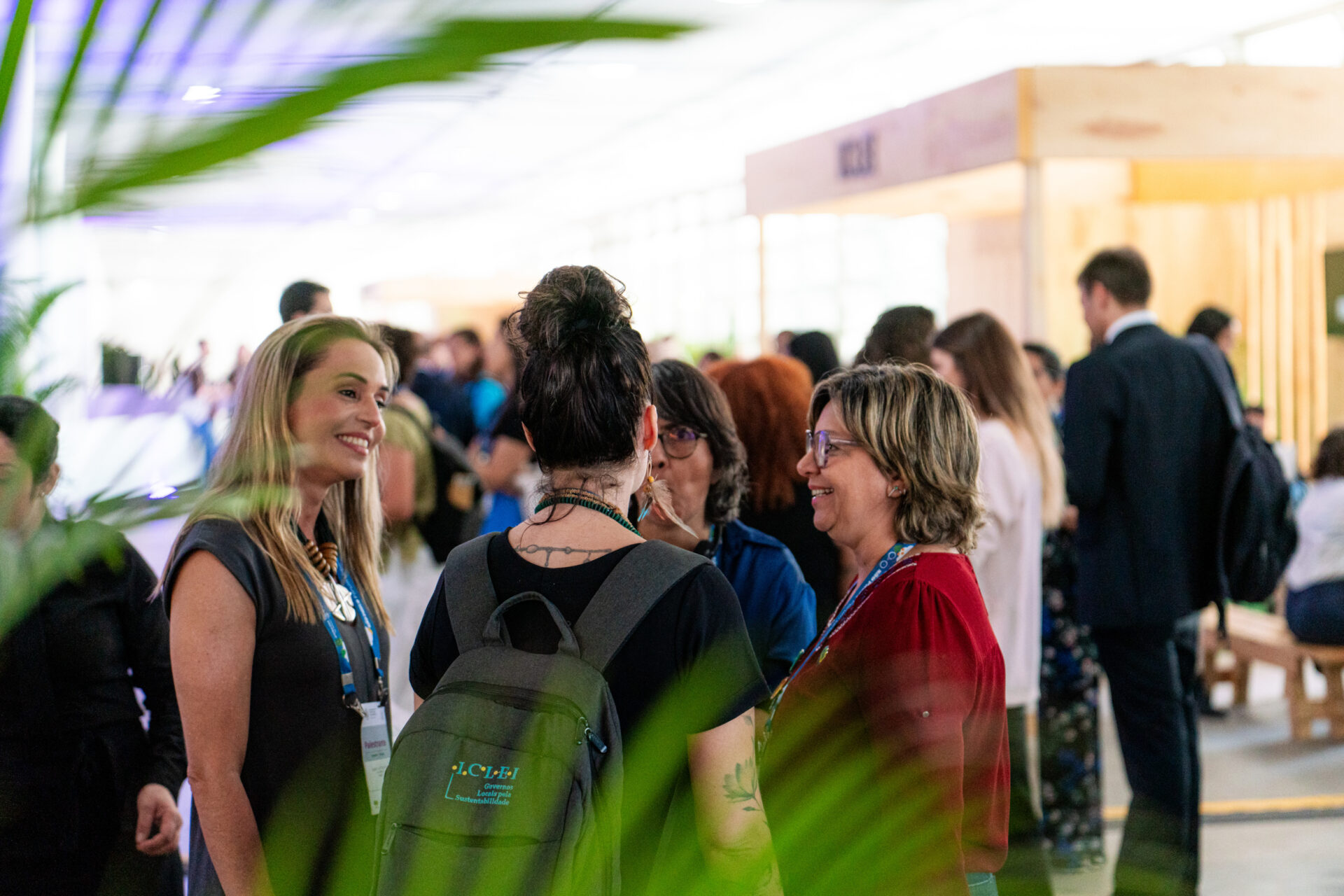
Aligned with ICLEI’s event sustainability goals, Urbia Parks, the concessionaire responsible for managing Ibirapuera Park, uses an advanced sorting station that selects recyclables to be sent to cooperatives. These recyclables are circulated until they can be resold to industry. Organic waste is processed in a biodigester and turned into fertilizer for the park.
Equity at the ICLEI World Congress 2024
Our goal was to create an event that was both accessible and inclusive, reflecting our commitment to equity and representation. Our approach encompassed a range of strategies designed to ensure that every participant felt welcomed and valued.
We worked to seek equity in every aspect of the Congress, from linguistic accessibility to local community support, from venue accessibility to diverse catering options. This commitment to accessibility not only enhanced the event’s overall atmosphere but also ensured that everyone, regardless of background or ability, could participate fully and comfortably.
Our commitment to equity
In line with ICLEI’s Equitable Events Guidelines, developed as a part of the last ICLEI World Congress in Malmö, Sweden, we committed to delivering an accessible and inclusive Congress in 2024. In order to achieve this goal we:
- Ensured venue accessibility including ramps and clear tape marking on stairs;
- Created event accessibility through features such as interpretation between Portuguese, English and Spanish and the use of sign language interpreters;
- Provided catering with diverse food options for dietary restrictions;
- Offered a diverse event program that included representatives from different regions, genders, age groups, etc;
- Prioritized accessibility in communications and digital channels;
- Provided moderators, speakers, and key staff with equity guidelines;
- Delivered reliable internet connection for digital resources and accessibility tools;
- Facilitated opportunities for participants to share experiences and explore the park and city together.
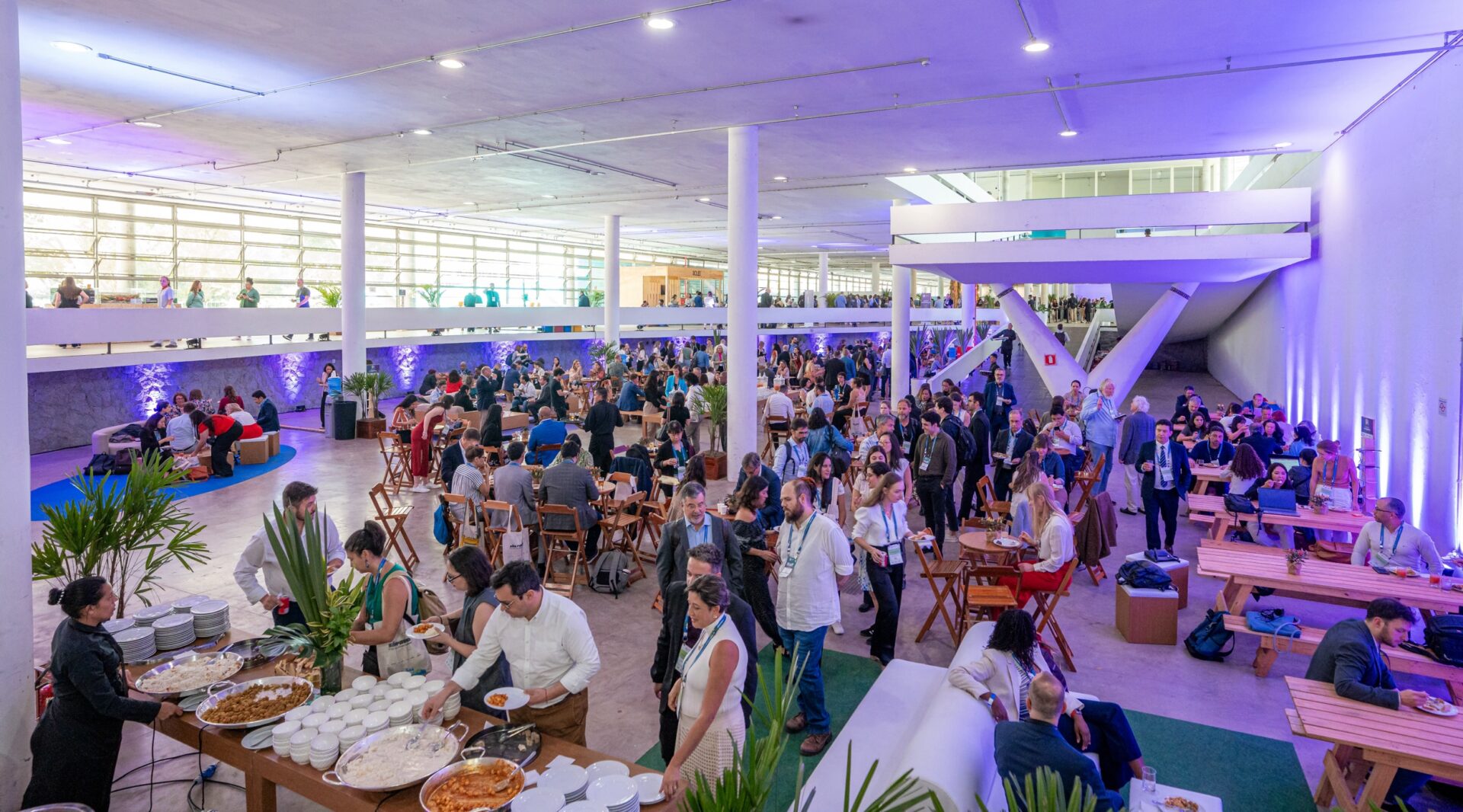
A special equity feature at this Congress were sign language interpreters who supported interpretation between Portuguese and Brazilian Sign Language at all plenaries and thematic sessions. Brazil is one of 77 countries in which sign language is legally recognized and it is one of the earlier countries to take this step.
Accelerating forward: Mapping our path to 2030
Our collective journey towards sustainable development is only gaining momentum.
At the ICLEI World Congress 2024, we connected, collaborated, and committed to innovative projects, impactful partnerships, and strategic initiatives that will drive our network forward in our shared mission for a sustainable future. These collaborations are crucial for enhancing collective local action on sustainability and achieving the ambitious goals set out in the ICLEI Strategic Vision 2024-2030.
As instability threatens the globe, we need to prepare our communities to adapt and respond to current and future challenges.
Local and regional governments need to prioritize inclusive approaches to policy-making and implementation, actively engaging and collaborating with underrepresented segments of the community. This means a transition for the role of local and regional governments from service providers to community enablers.
The ICLEI World Congress 2024 featured the stories of communities that are doing just that, showcasing approaches that ICLEI Members use to equitably and sustainably adapt, anticipate and respond to present and future challenges, especially those that bring new voices to the table, including youth, vulnerable groups and community-based groups.
We are focused on charting the path ahead, ensuring that our efforts as a global network continue to accelerate. Thank you to our amazing host, the City of São Paulo, Brazil; our highly committed Members around the world; all of our partners and donors; and everyone working with us to harness the power of our network to create lasting change for communities worldwide.
